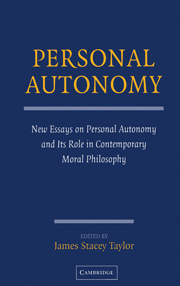Book contents
- Frontmatter
- Contents
- List of Contributors
- Acknowledgments
- Introduction
- PART I THEORETICAL APPROACHES TO PERSONAL AUTONOMY
- 1 Planning Agency, Autonomous Agency
- 2 Autonomy without Free Will
- 3 Autonomy and the Paradox of Self-Creation: Infinite Regresses, Finite Selves, and the Limits of Authenticity
- 4 Agnostic Autonomism Revisited
- 5 Feminist Intuitions and the Normative Substance of Autonomy
- 6 Autonomy and Personal Integration
- 7 Responsibility, Applied Ethics, and Complex Autonomy Theories
- PART II AUTONOMY, FREEDOM, AND MORAL RESPONSIBILITY
- PART III THE EXPANDING ROLE OF PERSONAL AUTONOMY
- Index
2 - Autonomy without Free Will
Published online by Cambridge University Press: 03 December 2009
- Frontmatter
- Contents
- List of Contributors
- Acknowledgments
- Introduction
- PART I THEORETICAL APPROACHES TO PERSONAL AUTONOMY
- 1 Planning Agency, Autonomous Agency
- 2 Autonomy without Free Will
- 3 Autonomy and the Paradox of Self-Creation: Infinite Regresses, Finite Selves, and the Limits of Authenticity
- 4 Agnostic Autonomism Revisited
- 5 Feminist Intuitions and the Normative Substance of Autonomy
- 6 Autonomy and Personal Integration
- 7 Responsibility, Applied Ethics, and Complex Autonomy Theories
- PART II AUTONOMY, FREEDOM, AND MORAL RESPONSIBILITY
- PART III THE EXPANDING ROLE OF PERSONAL AUTONOMY
- Index
Summary
Discussions of personal autonomy often proceed as if the free-will problem does not exist. Yet an incompatibilist – one who regards determinism as a genuine threat to free will – may wish to argue that an account of autonomy or self-government is severely compromised by the discovery that the self in question is a deterministic product of heredity and environment. Such a discovery would entail, in her eyes, that, even if I am judged autonomous through, say, a capacity for uncoerced and rational review of my deepest commitments (plus the ability to make appropriate adjustments), the failure in a deterministic world to control the origination of my desires and values, elements that explain my commitments, renders my self-governance seriously inauthentic.
Yet compartmentalization is an essential tool for the avoidance of intellectual paralysis. Perhaps then we ought not to worry simultaneously about both the conditions of autonomous decision making and the possibility that determinism will render our results a sham. If autonomy is our concern, we can let the other philosophical fellow raise the specter of enslavement of self arising from the domination exerted by heredity and environment over the elements that manifest our autonomy. Although no one can object to this pillar of intellectual practice, I would like to try to accommodate that peculiarly philosophical mindset that drives us to excess, that demand to be in good faith that, we suppose, fails to be met by a shallow theory that refuses to face the implications of our immersion in a controlling, hostile world.
- Type
- Chapter
- Information
- Personal AutonomyNew Essays on Personal Autonomy and its Role in Contemporary Moral Philosophy, pp. 58 - 86Publisher: Cambridge University PressPrint publication year: 2005

